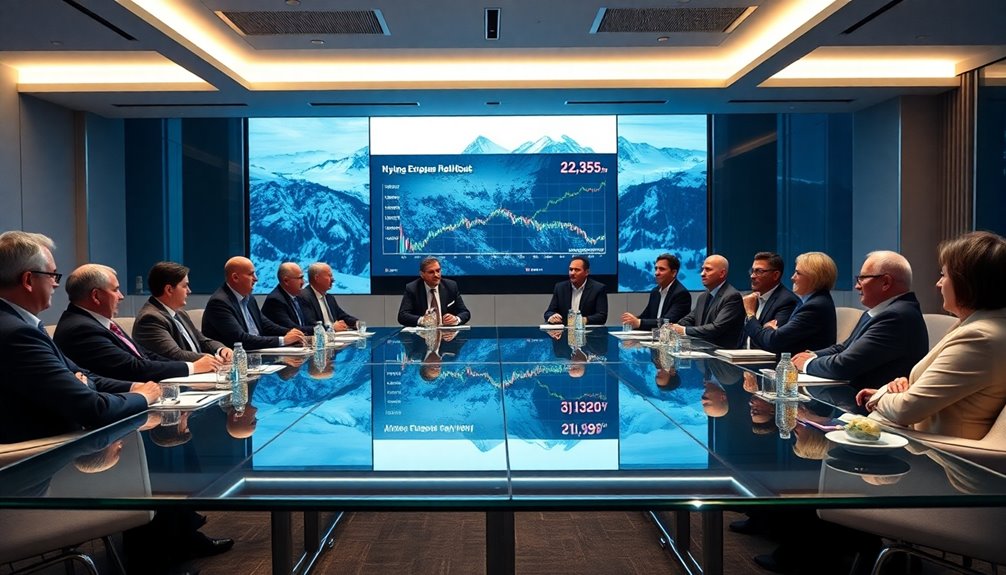At the Davos Web3 Summit, global leaders will gather to discuss the future of decentralized technology. You'll find key topics like blockchain scalability, interoperability, and decentralized finance taking center stage. Participants will also launch a whitepaper on global inclusion titled "Ushering a New Billion into the Global System." Expect intense discussions on regulatory frameworks and innovative solutions that promote sustainability. With pro-crypto policies emerging, the landscape is shifting to create new opportunities. This summit promises to inspire ideas that could shape the next chapter in decentralized tech. There's much more to uncover about these transformative discussions.
Davos Web3 Summit Overview

As global leaders converge in Davos, Switzerland on January 22, 2025, the Davos Web3 Summit promises to be a pivotal event for the future of decentralized technology.
With 100 of Web3's brightest minds in attendance, you'll engage in groundbreaking discussions and strategic networking aimed at shaping the industry. Key topics will include blockchain scalability, interoperability, and the evolution of decentralized finance.
You'll also witness the launch of a whitepaper titled "Ushering a New Billion into the Global System," outlining actionable strategies for global inclusion. Additionally, the Davos Declaration will set a visionary framework for fostering innovation, inclusion, and sustainability.
This summit is your chance to be part of transformative initiatives that redefine our digital and economic landscapes. Furthermore, the event will feature keynote speakers who are leaders in the Web3 space, providing invaluable insights into the latest trends and innovations.
Regulatory Updates on Cryptocurrencies

While the landscape for cryptocurrencies is rapidly evolving, recent regulatory updates are creating both opportunities and challenges for the industry.
The repeal of SAB 121 could empower banks to engage more freely with cryptoassets. Additionally, President Trump's appointment of pro-crypto leaders to the SEC, OCC, FDIC, and Federal Reserve suggests a shift toward a more favorable regulatory environment. This anticipated guidance from US banking regulators is expected to facilitate bank engagement with digital assets.
However, as states increasingly require blockchain companies to obtain money transmitter licenses and comply with local laws, navigating these rules can be complex.
The impending MiCA regulation in the EU and the UK's upcoming framework also signal global coordination efforts that might influence U.S. regulations, presenting both hurdles and avenues for innovation in the cryptocurrency space.
Crypto Price Volatility Analysis

Crypto price volatility remains a defining characteristic of the market, driven by factors such as market sentiment, supply and demand dynamics, and technological advancements. You'll notice how market sentiment can swing prices dramatically, with good news pushing them up and bad news causing sharp declines. Emotional trading often fuels this volatility, as fear and greed lead to herd behavior among investors. Limited supply, like Bitcoin's 21 million cap, can create upward pressure when demand spikes, further amplifying price swings. Additionally, whale trades can distort market trends and affect smaller assets more severely due to low liquidity. As the crypto landscape evolves with technological advancements, the interplay between these factors will continue to shape market dynamics and pricing strategies, especially as institutional investment increases in the sector.
Corporate Blockchain Integration Strategies

To successfully integrate blockchain technology into corporate structures, businesses must prioritize stakeholder engagement and education. Involve top executives, IT teams, end-users, and external partners in the integration process. Ensure everyone understands blockchain, its benefits, and its impact on their daily work. Address any concerns stakeholders might’ve and maintain open communication throughout. Foster a collaborative environment where everyone feels informed and involved, providing training resources to help them adapt. Additionally, implementing strong security measures is crucial. Encrypt sensitive data, set up access controls, and conduct regular security audits to build trust. Furthermore, it is essential to create a detailed integration plan for existing systems to ensure successful integration. Moreover, keeping abreast of the latest trends, such as the emerging Dubai blockchain technology developments, can offer valuable insights for enhancing the integration process. By leveraging successful case studies and innovations from these advancements, businesses can tailor their strategies to better align with industry standards. This proactive approach not only boosts the effectiveness of the integration but also positions the organization as a leader in adopting cutting-edge technologies.
Global Leaders' Policy Discussions

As businesses increasingly adopt blockchain technology, global leaders are now focusing on shaping policies that govern its use and impact.
They're advocating for decentralized digital infrastructure to enhance security and integrity across web3 platforms. Emphasizing multi-stakeholder approaches, they're involving the public sector, private sector, and civil society in governance discussions. This collaboration seeks to promote transparency in decision-making, ensuring that diverse perspectives are considered in the regulatory frameworks.
Risk-calibrated oversight is key, allowing targeted regimes for various web3 activities. Leaders are also pushing for clear tax rules to ensure transparency and compliance in digital assets.
With global coordination, they aim to harmonize regulatory frameworks, fostering innovation while addressing risks. Through initiatives like the DavosWeb3 Roundtable, these conversations are paving the way for a unified and sustainable future in decentralized technology.
Emerging Trends in Decentralization

While many industries are exploring the potential of decentralization, several emerging trends are shaping its future.
You'll notice decentralized governance is evolving, with tools that help voters delegate decisions and AI automating processes. The convergence of AI and blockchain enhances decision-making, utilizing predictive analytics and intelligent smart contracts. Additionally, the rise of decentralized finance is encouraging businesses to adopt cost-effective payment solutions, further driving the need for innovative governance structures.
Blockchain interoperability is gaining traction, allowing seamless data exchange and asset tokenization, particularly in real estate and commodities. Real-world asset tokenization is projected to soar, creating new investment dynamics.
Lastly, decentralized renewable energy grids and supply chains are optimizing efficiency and transparency, incentivizing clean power distribution.
These trends signal a transformative shift, making decentralization more accessible and impactful across various sectors.
Frequently Asked Questions
What Is the History of Davos and Its Connection to Technology?
Davos has a rich history, starting in 1971 when it brought together leaders to discuss global issues.
You'll find that it's evolved to address technological advancements, like in 1998 when the G20 concept emerged during a financial crisis.
Over the years, Davos has focused on sustainable practices and innovation, highlighting the importance of technology in shaping economies and fostering international cooperation.
This makes it a key platform for discussing future challenges and opportunities.
How Can Individuals Participate in Future Davos Web3 Events?
You can dive headfirst into the electrifying world of future Davos Web3 events!
Picture yourself networking with the brightest minds, chatting over breakfast with industry titans, or joining exclusive roundtable sessions.
You'll gain unparalleled insights into blockchain and DeFi, and even contribute to groundbreaking whitepapers.
Plus, by engaging with innovative platforms, you're not just participating—you're shaping the future of decentralized tech.
Seize this chance to make your mark in the revolution!
What Roles Do Non-Crypto Companies Play in Web3 Discussions?
Non-crypto companies play a pivotal role in Web3 discussions by exploring blockchain applications across various industries.
You're seeing them integrate decentralized technologies into healthcare, supply chain management, and governance. They contribute to developing regulatory frameworks, ensuring security and compliance.
By collaborating with crypto-native businesses, they enhance operational efficiencies and consumer experiences.
These companies also focus on tokenizing real-world assets, bridging the gap between traditional industries and innovative decentralized solutions.
How Is Web3 Impacting Traditional Financial Systems?
Isn't it funny how traditional finance thought it was safe from disruption?
Web3's shaking things up by slashing operational costs and cutting out intermediaries. You'll see efficiency soar as blockchain technology simplifies transactions and automates processes with smart contracts.
Plus, decentralized finance opens up access for everyone, even the underbanked.
While traditional systems cling to their ways, Web3's redefining financial landscapes and democratizing access, making the old guard look outdated.
What Are the Environmental Concerns Related to Decentralized Technologies?
When you consider decentralized technologies, you'll notice several environmental concerns.
High energy consumption from blockchain operations strains electrical grids and contributes to greenhouse gas emissions.
The mining hardware has a limited lifespan, leading to significant e-waste and challenges in responsible disposal.
Additionally, resource extraction for this equipment depletes valuable metals and rare earth elements, which can have detrimental long-term effects on ecosystems and public health.
It's crucial to address these issues for sustainability.
Conclusion
As the Davos Web3 Summit wraps up, it's clear that decentralized technology is shaping our future. With global leaders addressing regulatory frameworks and corporate strategies, the conversation is just beginning. Are you ready to embrace the changes that decentralized tech will bring to your life? The emerging trends and discussions from this summit highlight the urgency for innovation and collaboration. Stay tuned, because the next chapter in the world of Web3 is unfolding right before our eyes.









